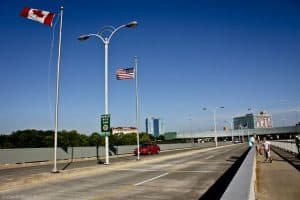 June 16, 2018 – U.S. border agents have the right to demand passwords to search phones and other devices such as laptops without specific reason when Canadians cross the border.
June 16, 2018 – U.S. border agents have the right to demand passwords to search phones and other devices such as laptops without specific reason when Canadians cross the border.
Travellers are being advised to put mobile phones in ‘flight mode’ to protect privacy, as border agents cannot download from remote, or cloud, storage without giving a reason.
If access to the device is refused, the border agent has the power to confiscate it for five days and sometimes longer.
Experts are suggesting travellers remove any sensitive data and expect their phones to be searched whenever crossing into the U.S.
The number of times border agents who inspected phones spiked by 60 per cent in 2017. Phones were checked more than 30,000 times as travellers crossed the border.
The Department of Homeland Security says the figure is a tiny fraction of the number of people crossing the border. It says the powers are necessary in the global fight against terror and child pornography.
U.S. Customs set new rules on phone searches as of January 4, 2018. The rules limit what agents can search and when they are allowed to search deeper by downloading from remote storage.
What Powers Do U.S. Border Agents Have to Search Phones?
- U.S. border agents have the power to deny entry to anyone who refuses to allow their phone to be searched. They need no reason to demand a phone and the password to open and look through it.
- Officers must shut off connectivity before conducting the search, but travellers are advised to do that themselves so as to be certain the scope of the search is limited.
- Deeper searches can only take place where it is deemed necessary for national security, and this can only occur if a higher ranked supervisor gives permission. In such case, the contents of the phone can be put onto a hard drive for analysis.
- If access to the phone is refused, officers can confiscate it for up to five days provided they document the incident. The phone can be kept beyond five days provided approval is granted.
- Lawyers can point out sensitive files under attorney-client privilege. Officers must seek legal advice before excluding them from the search. Other information like a journalist’s notes or a traveller’s medical records are also subject to U.S. privacy laws.
- Once the search is complete, any information taken from the device must be destroyed, unless a threat is discovered.
- Border crossers may be present when the search is conducted but are not allowed to see the screen of the device. They have the right to lodge a complaint and must be informed how to do so. Search statistics must be kept and made public. Officials plan to conduct frequent checks to ensure agents are following the rules.
Daniel Therrien, Canada’s federal government privacy commissioner warned in September 2017 that Canadians should be ‘very concerned’ about phones, tablets and computers being searched by U.S. border security.
Therrien urged those crossing the border to seriously think about the information stored on their devices.
Canadian border officers are also allowed to search devices, but the main difference is this can only occur where reasonable grounds to do so can be established.
What Is U.S. Border Preclearance?
Meanwhile, U.S. border preclearance on Canadian soil is soon to be expanded after the Pre-Clearance Act 2016 was voted through in December 2017, despite concerns.
Preclearance allows Canadians to clear U.S. customs and immigration before they travel, with the aim of reducing long delays, when crossing the border.
The service is already offered at eight Canadian airports and the Port of Vancouver and Vancouver’s train station. Services at Toronto’s Billy Bishop Airport, Quebec City’s airport and Montreal’s train station will soon be included.
Quick Facts: The Canada-U.S. Border
- Longest international border in world at 8,891km, 2,475km of which is with Alaska.
- 3 million Canadians travelled to the USA in February 2016, with 2 million moving in the other direction.
- 400,000 people and $2.4 billion in trade cross the border each day.
- Canada and US are second and fourth largest countries in the world by area.
- Canadian provinces and territories on border: Yukon, British Columbia, Alberta, Saskatchewan, Manitoba, Ontario, Quebec, New Brunswick.
- US states on border: Alaska, Washington, Idaho, Montana, North Dakota, Minnesota, Michigan, Ohio, Pennsylvania, New York, Vermont, New Hampshire, Maine.
Thousands of complaints were received by the federal government. Central to the issues raised were the new powers the bill grants to U.S. Customs and Border Protection authorities, based in Canada. These include the right to carry arms and the power to detain and question Canadians by an agent.
Prime Minister Justin Trudeau has previously sought to reassure Canadians that their rights are protected under the Canada Charter, when accessing preclearance facilities. The legal profession however strongly disputes such assurances.
Interested employers: Kindly contact us here to receive further information.
Interested candidates: Find out whether you qualify to Canada by completing our free on-line evaluation. We will provide you with our evaluation within 1-2 business days.
Read more news about Canada Immigration by clicking here.


